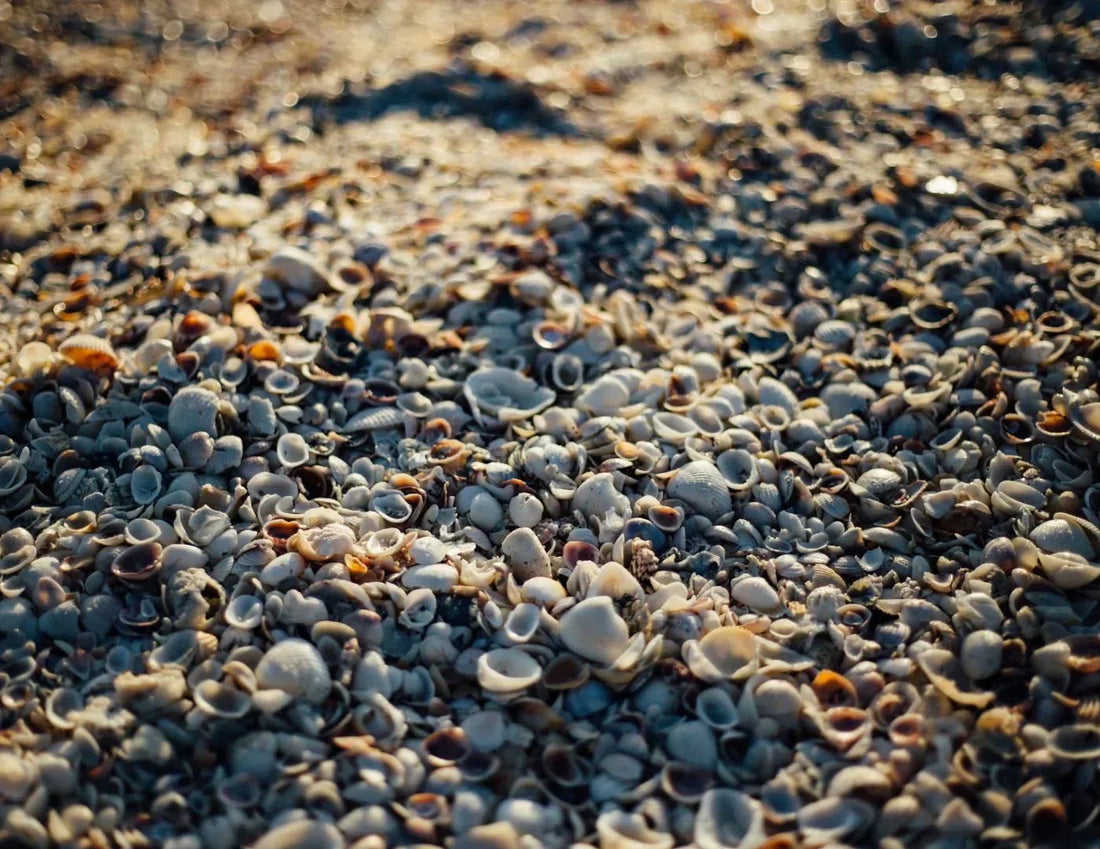
Seashells in Costa Rica: A Growing Problem
BY NAMUBAKShare
Seashells are much more than just souvenirs we collect on the beach . These natural structures play a fundamental role in marine and coastal ecosystems. However, their excessive extraction has generated a significant environmental impact, especially in countries like Costa Rica, where In 2023 alone, more than 5 tons of seashells were seized at the Juan Santamaría and Daniel Oduber airports. This blog explores the ecological importance of shells, the challenges associated with their conservation, and the innovative solutions being implemented in Costa Rica to protect them.
What Are Seashells and How Are They Formed?
Seashells are hard exoskeletons that protect various species of mollusks such as oysters, clams, snails and other marine organisms . These structures are mainly made up of calcium carbonate (CaCO3) and proteins , which mollusks extract from water, their food or corals.
The process begins when the mollusk uses a tissue called the "mantle" to produce a substance called conchiolin, which, when interacting with calcium carbonate, forms the shell. These structures grow throughout the mollusk's life through "growth bands" that allow it to adapt to its needs.
However , factors such as global warming and heavy metal pollution can disrupt this process, underscoring the need to conserve marine ecosystems.

The Importance of Seashells in Ecosystems
• Cleaning and Regulation of the Ecosystem
- Water filtration : Some species of conch, such as the queen conch (Lobatus gigas), filter wastewater and reduce excess phosphorus, improving water quality.
- Neutralizing ocean acidification : Being composed of calcium carbonate, shells help regulate the pH of the water, creating healthier environments for other species.
• Refuge and Biodiversity
- Home for other species : Empty shells are used by hermit crabs, fish, and other organisms as shelter and protection.
- Beach stabilization : They help prevent erosion by providing a solid base for coastal vegetation, reinforcing beaches against the impact of waves.
• Historical and Environmental Registry
- Ecological indicators : Shells reveal important data about the health of ecosystems and the levels of heavy metals in the environment.
- Environmental memory : Through its composition, it is possible to study past climatic conditions and predict future changes.
The Problem in Costa Rica: Seizures and Laws
Seashell harvesting has become a common practice among tourists who want to take home a souvenir from the beaches. However, this practice is punishable by law. Wildlife Law No. 7317 , which considers the capture, extraction, and transfer of shells a crime. Penalties can reach up to 30 base salaries .
In 2023, more than 5 tons of shells were confiscated at Costa Rican airports. While many of these shells could be returned to the sea, the lack of information about their origin—Pacific or Atlantic—makes their reintegration difficult, as introducing them into the wrong ecosystems could have negative impacts.

The Solution: The “Back Home” Program
In an effort to address this problem, Imperial Beer , in collaboration with the SINAC, the UCR, the MINAE and Aeris , launched the program “ Back Home ” This Innovative initiative uses an artificial intelligence-based application that allows you to identify the origin of a shell with just a photograph.
How does it work?
- The app analyzes specific characteristics of the shell to determine whether it belongs to the Pacific or Atlantic.
- Once identified, the shell is returned to the corresponding ecosystem, ensuring its proper reintegration.
This program not only helps return shells to their natural habitat, but also reinforces the importance of collaboration between public, private and academic entities in marine conservation.
What Can You Do to Protect Seashells?
- Don't take shells from the beach . Admire them and let them continue to fulfill their role in the ecosystem.
- Educate others on the importance of shells in marine ecosystems.
- Participate in conservation programs like “Back Home”.
- Avoid buying souvenirs made of shells or corals.
- Support local initiatives that protect marine biodiversity.
Frequently Asked Questions about Seashells
Yes, extracting seashells alters marine ecosystems and is against the law in Costa Rica. Furthermore, many species depend on them for shelter and food.
Shells help regulate water acidification, filter pollutants, stabilize beaches, and provide a home for numerous marine organisms.
Yes, but only if their source (Pacific or Atlantic) is identified. Otherwise, they could cause ecological imbalances.
The absence of shells can lead to beach erosion, loss of biodiversity, and deterioration of water quality.
This action is punishable by law. Wildlife Law No. 7317 , which considers the capture, extraction, and transfer of shells a crime. Penalties can reach up to 30 base salaries .
Final Reflection
Seashells aren't just ornaments; they're key components in maintaining the health of our marine and coastal ecosystems. With initiatives like "Back Home" and a shift in our individual practices, we can ensure these ecosystems continue to thrive. The next time you visit a beach, remember that The best way to take it with you is through memories and photographs, leaving the shells in their natural place.
Together, we can protect biodiversity and preserve the magic of our seas. Take action today!

